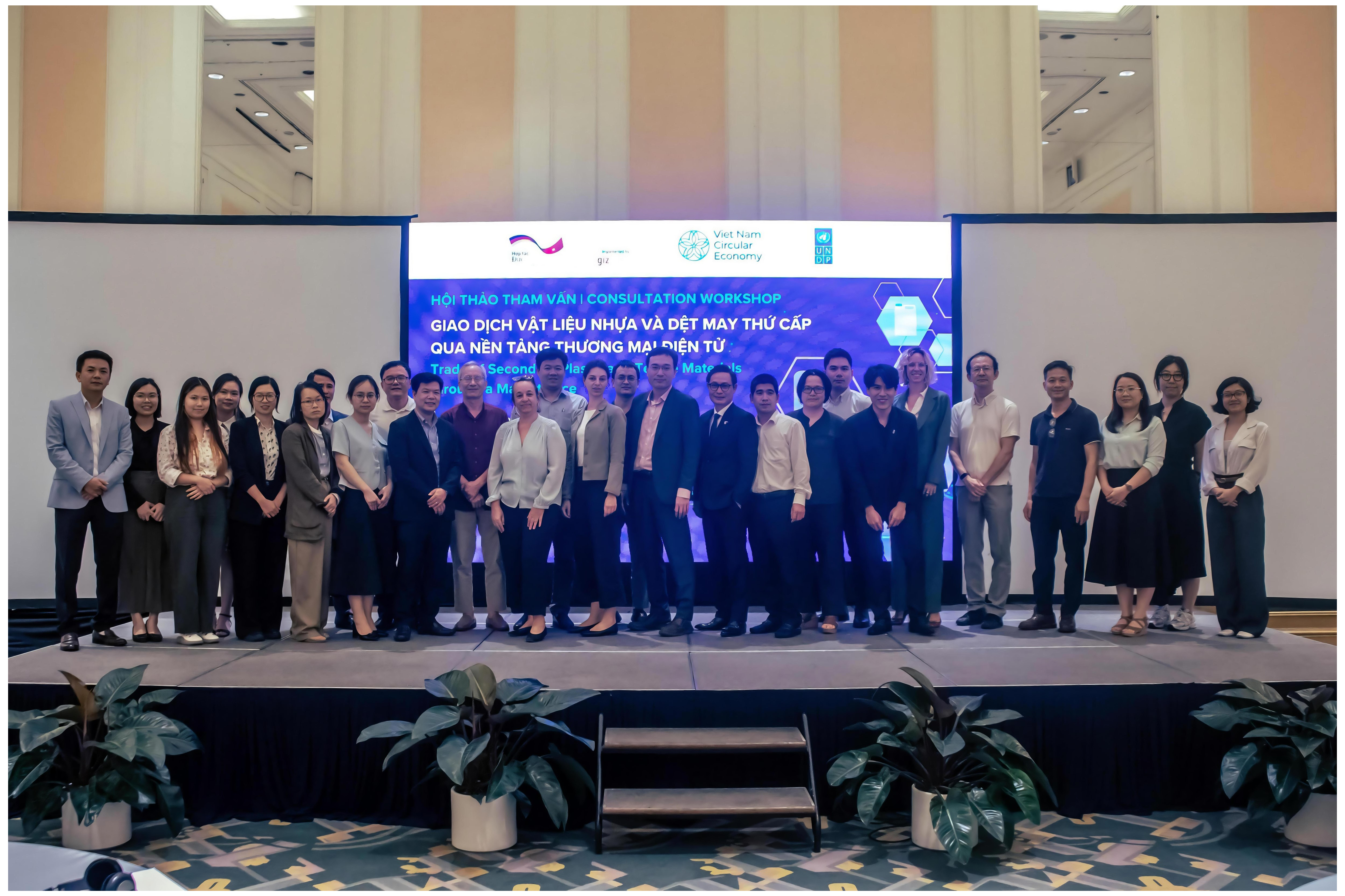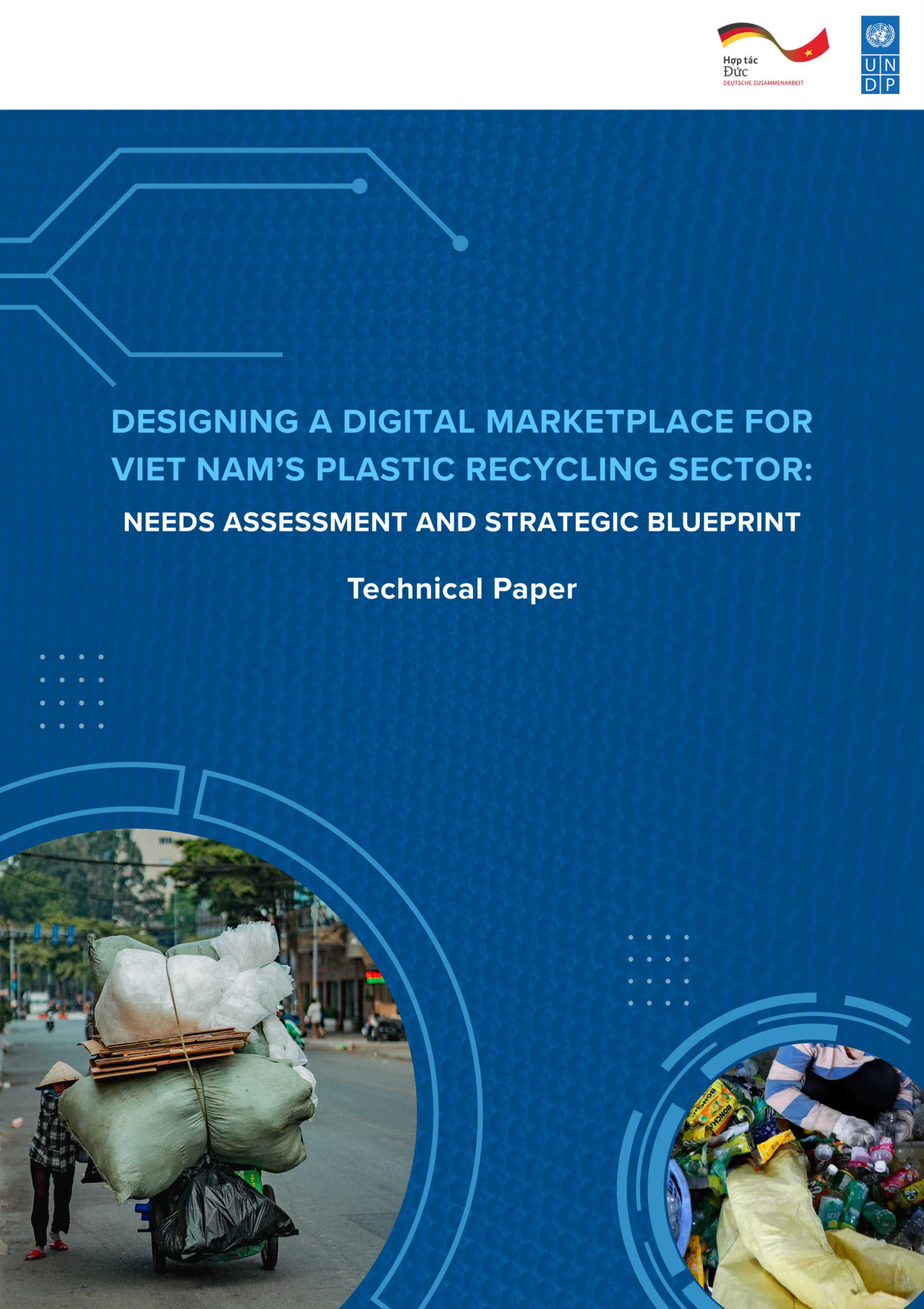Pathway for plastic and textile secondary material marketplaces
Marketplaces as a solution?
Viet Nam’s transition towards a circular economy, where plastic waste is viewed as a resource rather than waste, offers a solution. However, the informal nature of the plastic recycling industry in Vietnam, coupled with the characteristics of mixed and unclassified waste streams, poses significant challenges for recyclers in securing a reliable supply of quality feedstock and complying to regulatory bookkeeping requirements, let alone other social aspects of responsible sourcing. To address these issues, creating digital marketplaces for recycled materials seem to be a promising solution for facilitating trading and transparent transactions.
The consultation workshop, held on April 26, 2024, brought together 67 representatives from various sectors of the plastic value chain, including recyclers, manufacturers, and collectors. Additionally, policymakers, associations, non-profits, and development partners participated. Fruitful discussions during the workshop enabled the United Nations Development Programme (UNDP) to identify barriers and opportunities for designing and implementing a future marketplace.

Group photo of participants joining the workshop.
Key challenges surfaced during the consultation workshops
These challenges stem from three key areas:
- The Informal Nature of the Industry: Informal recycling ecosystem current enjoys lower operating costs due to the lack of documentation, labor regulations, and taxes. This creates an economic disincentive for them to join a formal marketplace with stricter requirements. Additionally, many lack the necessary licenses to operate legally on a digital platform.
- Difficulty Building Trust in a Digital Environment: The informal market thrives on established trust networks, relying on consistent quality and quantity of materials, as well as familiar communication channels like Zalo. Replicating this level of trust in a purely online marketplace will be challenging, especially when buyers and sellers interact directly without pre-existing relationships. Ensuring transparency and adherence to relevant criteria will also be crucial.
- Material-Specific Challenges: Defining clear specifications, requirements, and quality standards for recycled materials on a digital platform represents a significant hurdle. This is particularly true for large-volume transactions, where ensuring delivered products meet agreed-upon quality becomes complex. The classification and the technical specifications of the materials and the control and appraisal of buyers and sellers request to establish clear procedures.
- Deep Understanding of the Industry: The success of a B2B marketplace for secondary materials in Vietnam hinges on the owner’s deep understanding of the recycling industry, particularly plastics. It means that it is necessary a deep knowledge of the players that will be invited to join the marketplace and an inside-out understanding of their motivations and the practices you are trying to influence or change. However, this industry is notoriously complex, with multiple layers and interdependent factors influencing current practices.

Mr. Phạm Minh Tuấn, Director of VIKOHASAN Recycling JSC.
Key opportunities surfaced during the workshop
- Sustainability Leadership: Major brands are complying with stricter regulations (e.g., EU Product Passport for textiles) and seeking to attract sustainability-conscious consumers.
- Economic Opportunities: Transparency and better waste sorting can lead to increased tax revenue and new business opportunities for recyclers.
- Supportive Legislation: Vietnamese laws (Decree 52/2013/ND-CP, Circular 59) and waste exchange regulations provide a favourable environment for digital marketplaces and EPR regulation is expected to drive a transition to address economic compliance among the value chain, staring with the recyclers.

Mr. Nguyen Huu Tuan, Head of Policy, Viet Nam E-commerce and Digital Economy Agency (iDEA) is presenting the
Recommendations to move forward
- Private ownership and specialized operation are crucial to ensure the long-term success and effectiveness of digital marketplaces for secondary materials in Viet Nam. This model fosters a competitive market that attracts developers and investors, leading to cost-reduction and innovation. Sustainable revenue streams from transaction fees or advertising ensure platform stability and reinvestment. Furthermore, specialized operators bring deep industry knowledge to tailor the marketplace for all stakeholders, while also remaining responsive to market trends and user needs. Ultimately, private ownership promotes competition, adaptability, and economic growth, shaping a more efficient, sustainable, and environmentally responsible future for Vietnam’s recycling industry.
- Building successful digital marketplaces for Viet Nam’s recycling industry requires understanding both user needs and industry complexities. User surveys should be conducted to gather feedback on information requirements, platform features, and desired functionalities like quality assurance and flexible payment options, and also psychological rationale behind the needs. This user-centric approach, coupled with in-depth industry knowledge, allows for expert advice and technical support to digital innovators who would develop marketplaces to effectively serve potential users.
- A strategic pilot is recommended to ensure a smooth launch, or at least, can narrow scope of failure factors for secondary material marketplaces. Initially, the focus should be on post-industrial plastics and textiles to minimize transportation and sorting costs. Pilot projects with individual companies will allow for testing and refinement before full-scale deployment. Additionally, separate marketplaces should be established for plastics and textiles due to their distinct properties. The textile sector is a prime candidate to start due to its high waste volume and brand awareness of relevant regulations.
- Integrating them with existing platforms to streamline user adoption of Viet Nam’s digital marketplaces for secondary materials. This includes connecting with extended producer responsibility (EPR) platforms for easy data exchange and simplifying reporting. Additionally, integration with factory enterprise resource planning (ERP) systems allows for seamless data transfer and process automation. These integrations offer several advantages. Manual data entry and reconciliation are eliminated, reducing errors and saving time. Data consistency and accuracy across platforms improve decision-making, while automated data sharing and workflow integration streamline operations and enhance overall efficiency. By leveraging existing infrastructure, these marketplaces can provide a user-friendly and efficient experience.
You can access the workshop materials through this link.












